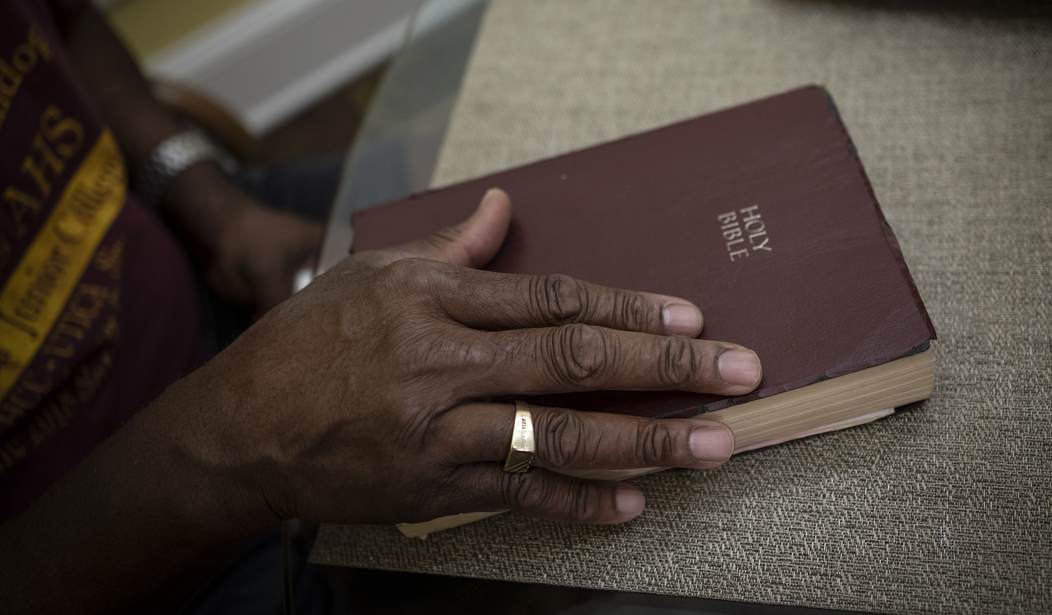It was the kiss cam moment seen around the world—the now-infamous shot of Astronomer CEO Andy Byron and the company’s Chief People Officer Kristin Cabot, caught embracing as lovers at a Coldplay concert on July 16, 2025. Much ink has already been spilled over the specifics, so there’s no need to add more here. But one aspect of this incident that has gone largely unremarked on is that this wasn’t just a PR scandal or a marital implosion. What we witnessed was an image of someone caught in sin, feeling the shame of it, and reacting as only the weakest of cowards would. In that sense, we saw an embodiment of the Biblical Adam.
My initial reaction to the video was that these two were clearly in the wrong. Their body language betrayed it—as Coldplay front man Chris Martin noted from the stage, “Either they’re having an affair or they’re just very shy.” We knew at once it was the former. And that’s awful. Two families are shattered. A company’s workforce is shaken. For the public, it became a moment of macabre entertainment. For the people involved and their loved ones, it’s a crisis of devastating proportions.
🚨Just in: Astronomer CEO Andy Byron has officially resigned from the company after the viral video from the Coldplay concert pic.twitter.com/yDutZrMKJg
— The Calvin Coolidge Project (@TheCalvinCooli1) July 19, 2025
As I reflected on that scene, my surprise turned to anger. By being there together, Byron and Cabot were actively betraying their families—and clearly enjoying the thrill of it. What we witnessed were the final moments of delight in Eden’s forbidden fruit, just before the shame set in. Watch the clip again: Kristin Cabot’s expression changes first, a flash of horror overtaking her face. Then comes the look of deep concern from Andy Byron. She quickly covers her face and turns away. And Byron, the man, the CEO, the supposed leader? He ducks out of frame, abandoning his mistress to the camera’s gaze, the shame and the crowd’s laughter. Moments before, Byron was betraying his wife. Now he also betrayed the woman with whom he was having an affair. It was a coward’s move—a trait inherited from the original Adam.
Genesis 3:12 tells us that when God confronted the first man about eating the forbidden fruit, Adam deflected blame: “The woman you gave to be with me—she gave me some fruit from the tree, and I ate.” It’s the same script we saw play out on that concert screen: abandonment, shame, and blame.
But the cowardice of Adam and Andy is hardly isolated. We see it repeated across our culture—in grown men who won’t commit to the women they impregnate, in absentee fathers, in elected officials too timid to stand against gender activists, in military officers who enforce unlawful orders, and in pastors who chase cultural approval instead of truth. America doesn’t suffer from an excess of toxic masculinity—it suffers from a plague of toxic male cowardice. We have too many adult males, but too few men.
READ RELATED: Christianity Needs to Be Real and Aggressive in the Cultural Space, Not Accommodating (VIP)
John MacArthur, Pastor, Reformed Theologian, and Cultural and Political Lighting Rod, Dead at 86
There’s a second truth this episode illustrates: moral relativism is a myth. The ones who drove this moment into the public conscience weren’t from among the church—they were unbelievers. It was the wider public, of all belief systems, who saw shame and instinctively recognized the immorality and its associated guilt. Observers didn’t need a theology degree to know what we all witnessed on that concert screen was wrong.
A third thing I feel the need to address is the over-pietism shown by some Christians who are invoking John 8:7—“Let the one without sin cast the first stone”—as a reason to criticize others who comment on the situation. The same God who shows mercy to the repentant prescribes severe penalties for unrepentant sin elsewhere in scripture. “Do not be deceived: neither the sexually immoral, nor idolaters, nor adulterers, nor men who practice homosexuality, nor thieves, nor the greedy, nor drunkards, nor revilers, nor swindlers will inherit the kingdom of God” (1st Corinthians 6:9-10). Sexual sin isn’t trivial. Infidelity brings the destructive force of a nuclear warhead into the heart of family life. It is right that society should stigmatize adultery, in order to make it unpalatable. In fact, we’d be a healthier society if we criminalized it. The law, after all, is a teacher.
Some, especially on LinkedIn, have gone so far as to scold anyone who’s spoken about the affair between Andy Byron and Kristin Cabot, posturing a theology in which calling out public sin is itself morally wrong. Ironically, in doing so, they cast their own stones—against those who take moral clarity seriously—and benefit from the same algorithmic attention they condemn in others. The response most congruent with a mature theology is to not let a desire to be pious drive a response that mirrors moral relativism. It is instead to pray that this public revelation of sin will drive all affected to the foot of the cross, and effectively caution others to stay away from forbidden fruit.
Finally, on a deeper theological level, we must remember that silence in the face of open sin does not honor God. Christ’s mercy was always given in tandem with repentance. In the absence of repentance, scripture speaks plainly of judgment. It is loving to warn that sin leads to destruction, and to guide culture toward honoring virtue and shaming vice.
We saw in this moment the horror, cowardice, and betrayal wrought by a weak adult male, an image from those late moments in the Garden of Eden. There’s no better endorsement of why Godly manship is a foundational requirement for stable societies. Let us point to the former as a warning, and to the latter as a goal.













Join the conversation as a VIP Member